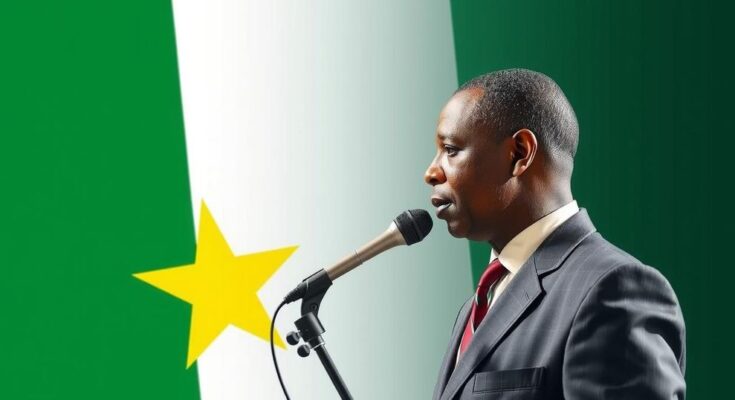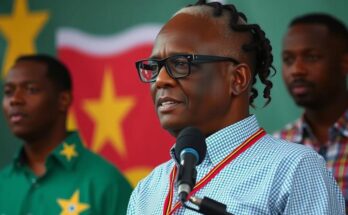Senegal held parliamentary elections on Sunday, determining whether President Bassirou Diomaye Faye can implement his reform agenda. With his party, PASTEF, fighting for a majority against the opposition coalition led by former President Macky Sall, the election reflects the population’s ambitions for economic improvements. The political climate is tense, characterized by recent violence and widespread public frustration. Initial results are expected soon, influencing the future governance of Senegal.
On Sunday, Senegal concluded its parliamentary elections, a pivotal event to ascertain whether President Bassirou Diomaye Faye can implement his proposed reforms. With over 7 million registered voters selecting 165 members for the National Assembly, Faye’s political party, PASTEF, currently lacks a majority. Elected in March on an anti-establishment platform, Faye has struggled to initiate critical reforms addressing corruption and securing a fair distribution of the country’s natural resources, as a result of opposition dominance in parliament. In a strategic move, Faye dissolved the opposition-led parliament in September, which triggered this snap election. His primary competitors include the Takku Wallu opposition coalition, led by former President Macky Sall, and multiple other political factions. While polling stations operated from 8 a.m. to 6 p.m., the final results will not be made public until later in the week. Analysts suggest that Faye needs at least 83 seats to achieve majority control, a target they believe is achievable given the party’s growing popularity. Faye ascended to the presidency with a strong mandate, securing 54 percent of the vote in March, marking him as the youngest leader in Africa at the age of 44. His election underscored a generational shift, reflecting the discontent among Senegal’s youth, many of whom are struggling with economic challenges exacerbated by soaring inflation. Voter Aita Pene expressed hopes for better job prospects saying, “We need to be able to live a good life,” with an eye on reducing emigration for economic opportunities. The lead-up to this election was fraught with confrontation, as sporadic clashes erupted between party supporters, including the arson of an opposition party’s headquarters. Ousmane Sonko, the Prime Minister who has been a significant ally to Faye, condemned violence against their supporters but also urged restraint. Faye himself appealed for peaceful acceptance of election outcomes, emphasizing Senegal’s valued identity as a stable democracy in a region marred by political instability. The recent turbulent political climate, marked by unprecedented protests and a crackdown on dissent, questioned Senegal’s commitment to democratic ideals. Following the presidential election in March, significant public unrest occurred after both Faye and Sonko were subjected to political incarceration, leading to mass protests with numerous casualties and arrests. With many citizens wary of Sall’s potential attempts at a third term, this election is crucial in determining the future political landscape of Senegal, potentially influencing the administration’s ability to navigate critical reforms amidst a challenging economic climate.
The parliamentary elections in Senegal hold great significance for the current government led by President Bassirou Diomaye Faye, elected in March. Facing an opposition-dominated parliament, Faye aims to enact reforms necessary for addressing corruption and enhancing national resource management. The backdrop includes a climate of political turmoil, with protests and violence underscoring public frustration, particularly among the youth. Given the high percentage of the population under 25 and the economic challenges they face, the election’s outcome will significantly impact their prospects. Faye’s government seeks to maintain Senegal’s reputation as a stable democracy in West Africa, a region encountering significant political upheaval.
The electoral process that took place in Senegal signifies a critical juncture for President Bassirou Diomaye Faye’s administration and the potential for transformative reforms. As citizens expressed their hopes for economic progress through their votes, the future effectiveness of Faye’s governance hinges on whether his party can secure a parliamentary majority. The elections were not only a reflection of political ambitions but also a response to years of public dissent and demand for accountability. The preservation of Senegal’s democratic image amidst regional instability remains paramount as the nation navigates the outcomes of this pivotal election.
Original Source: www.pbs.org



